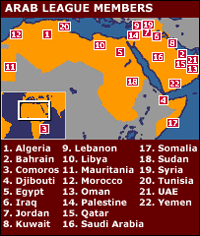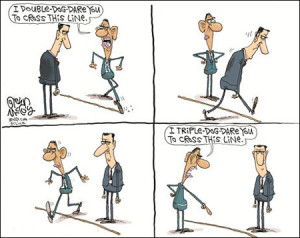US military ready to take action against Syria
Daily News Article — Posted on August 28, 2013

Syrian President Bashar Assad
(from NYPost) AP, WASHINGTON — U.S. military forces stand ready to strike Syria at once if President Barack Obama gives the order, Defense Secretary Chuck Hagel said Tuesday as the United States prepared to declare formally that chemical weapons had been used in the Syrian civil war.
U.S. officials said growing intelligence pointed strongly toward Syrian President Bashar Assad‘s government as the culprit – a claim Assad called “preposterous.” There were cautions from the White House that the goals of any military action would be measured, not intended to drive Assad from power. …
The U.S., along with allies in Europe, appeared to be laying the groundwork for the most aggressive response since Syria’s civil war began more than two years ago. The White House said Obama had not settled on what action to take in response to the large-scale use of deadly gases, a move Obama said last year would cross a red line. …
It’s unlikely international military action would begin before Thursday. That’s when British Prime Minister David Cameron will convene an emergency meeting of Parliament where lawmakers are expected to vote on a motion clearing the way for a British response to the chemical weapons attack.
International support is growing. In Paris, French President Francois Hollande said Tuesday that France is “ready to punish those who took the heinous decision to gas innocents.” And the Arab League*, a 22-member body dominated by Saudi Arabia and Qatar, also called for justice, laying blame for the attack on the Syrian government.
 *NOTE: The Arab League is a regional organization of Arab states in North and Northeast Africa, and Southwest Asia (Middle East). It was formed in Cairo in 1945 with six members: Egypt, Iraq, Transjordan (renamed Jordan in 1949), Lebanon, Saudi Arabia, and Syria. Yemen joined as a member in May 1945. The Arab League currently has 22 members (including one, Syria, whose participation was suspended in November 2011) and four observers. The main goal of the league is to “draw closer the relations between member States and co-ordinate collaboration between them, to safeguard their independence and sovereignty, and to consider in a general way the affairs and interests of the Arab countries.”
*NOTE: The Arab League is a regional organization of Arab states in North and Northeast Africa, and Southwest Asia (Middle East). It was formed in Cairo in 1945 with six members: Egypt, Iraq, Transjordan (renamed Jordan in 1949), Lebanon, Saudi Arabia, and Syria. Yemen joined as a member in May 1945. The Arab League currently has 22 members (including one, Syria, whose participation was suspended in November 2011) and four observers. The main goal of the league is to “draw closer the relations between member States and co-ordinate collaboration between them, to safeguard their independence and sovereignty, and to consider in a general way the affairs and interests of the Arab countries.”
Obama discussed the situation in Syria on Tuesday with Prime Minister Stephen Harper of Canada, a NATO ally. The president has also spoken with Cameron, Hollande and Australian Prime Minister Kevin Rudd in recent days, and Vice President Joe Biden spoke Tuesday with Britain’s deputy prime minister, Nick Clegg.
Officials said the international community was considering action that would punish Assad for deploying deadly gases, not sweeping steps aimed at ousting the Syrian leader or strengthening rebel forces. The focus of the internal debate underscores the scant international appetite for a large-scale deployment of forces in Syria and the limited number of other options.
The most likely military response would involve sea-launched cruise missile attacks on Syrian military targets. The White House is also studying legal justifications for taking such steps without approval from the United Nations, where Russia is certain to block action at the Security Council. …
Hagel [said] that the Defense Department has “moved assets in place to be able to fulfill and comply with whatever option the president wishes to take.” The Navy has four destroyers in the eastern Mediterranean Sea within range of targets inside Syria. The U.S. also has warplanes in the region. “We are ready to go,” Hagel said.
Hagel said “to me it’s clearer and clearer” that the Syrian government was responsible, but that the Obama administration was waiting for intelligence agencies to make that determination. …
Assad, who has denied using chemical weapons, was defiant. In an interview published Tuesday on the website of the state-run Syrian Arab News Agency, Assad accused the U.S. and other countries of “disdain and blatant disrespect of their own public opinion; there isn’t a body in the world, let alone a superpower, that makes an accusation and then goes about collecting evidence to prove its point.”
The Syrian leader warned that if the U.S. attacks Syria, it will face “what it has been confronted with in every war since Vietnam: failure.”
The Obama administration was moving ahead even as a United Nations team already on the ground in Syria collected evidence from last week’s attack. The U.S. said Syria’s delay in giving the inspectors access rendered the U.N. investigation meaningless and that the Obama administration had its own intelligence confirming chemical weapons use.
The U.N. team came under sniper fire Monday as it traveled to the site of the Aug. 21 attack and on Tuesday delayed a second inspection. A U.S. official said the U.N. team’s delay would not affect the Obama administration’s timeline for releasing its own intelligence assessments.
It’s unlikely that the U.S. would launch a strike against Syria while the United Nations team is still in the country. The administration may also try to time any strike around Obama’s travel schedule – he’s due to hold meetings in Sweden and Russia next week – in order to avoid having the commander in chief abroad when the U.S. launches military action.
The president has ruled out putting American troops on the ground in Syria and officials say they are not considering setting up a unilateral no-fly zone.
On Capitol Hill, bipartisan support for a military response appeared to be building, with some key lawmakers calling for targeted strikes. A spokesman for House Speaker John Boehner said the Ohio Republican had “preliminary communication” with White House officials about the situation in Syria and a potential American response.
However, some lawmakers from both parties were calling on the president to consult Congress before moving forward. Republican Rep. Scott Rigell of Virginia is asking colleagues to sign a letter to the president urging him to reconvene Congress and seek approval for any military action.
More than 100,000 people have died in clashes between forces loyal to Assad and rebels trying to oust him from power over the past two and a half years. While Obama has repeatedly called for Assad to leave power, he has resisted calls for a robust U.S. intervention, and has largely limited American assistance to humanitarian aid. The president said last year that chemical weapons use would cross a “red line” and would probably change his calculus in deciding on a U.S. response.
Obama took little action after Assad used chemical weapons on a small scale earlier this year and risks signaling to countries like Iran that his administration does not follow through on its warnings.
Officials said it was likely the targets of any cruise-missile attacks would be tied to Syria’s ability to launch chemical weapons attacks. Possible targets would include weapons arsenals, command and control centers, radar and communications facilities, and other military headquarters. Less likely was a strike on a chemical weapons site because of the risk of releasing toxic gases.
Military experts and U.S. officials said Monday that the strikes would probably come during the night and target key military sites.
Reprinted here for educational purposes only. May not be reproduced on other websites without permission from The New York Post.
Questions
Welcome back teachers and students! Please note that the “Daily News Article” generally focuses on national news. However, in an attempt to give you an overview on events in the Middle East, we are posting several articles this week on the ongoing crises in Egypt (see Monday) and Syria. (Also, check out “Background” and “Resources” below the questions each day.)
1. Why is the Obama administration preparing to take action against Syria - what did the Syrian government do? What had President Obama warned last year? [see para. 1, 19-20]
2. Why won't any international military action take place before at least Thursday?
3. The United Nations Security Council (UNSC) is charged with the maintenance of international peace and security. Its powers include the establishment of peacekeeping operations, the establishment of international sanctions, and the authorization of military action. Its powers are exercised through United Nations Security Council Resolutions.
If this is the case, why won't the U.N. take any action against the Syrian government's use of chemical weapons against its citizens?
4. What two factors will influence the timing of a U.S. strike against Syria?
5. a) What type of action is President Obama expected to order against Syria?
b) What actions has he ruled out?
6. From the WSJ editorial "Why Obama Is Being Pulled Into Syrian Conflict"
"President Obama has said it wouldn't be acceptable for Syria to use chemical weapons, just as he has said it wouldn't be acceptable for Iran to develop nuclear weapons. He now must ponder whether the credibility of the first statement will affect the credibility of the second. That question burns particularly hot as the administration considers entering nuclear talks with the government of Iran's new president, Hasan Rouhani, even as Iran continues to deny it has nuclear-arms ambitions."
Should President Obama have issued these warnings to Syria and Iran if he was not prepared to take action? Explain your answer.
CHALLENGE QUESTION: Reuters reports: "Without some action soon, officials worry that Assad will feel he can resort to chemical weapons again with impunity - a year after Obama declared their use of a "red line" that, if crossed, would require strong action. Some also fear inaction in Syria could cast doubt over other U.S. "red lines." encouraging Iran to pursue a nuclear program which Tehran says is peaceful but the United States and its allies including Israel believe aims to produce weapons."
Read the commentaries under "Resources" below.
a) What would be the consequences of doing nothing?
b) What would be the consequences of intentionally (or unintentionally) removing Bashar Assad from power?
c) What action, if any, do you think the U.S. should take? Explain your answer.
NOTE: “Answers by Email” will resume September 3rd. Sign-up now.
Background

The Syrian Civil War:
- The Syrian civil war is an ongoing armed conflict in Syria between forces loyal to the Syrian Ba'ath Party government and those seeking to oust it.
- The conflict began on March 15, 2011, with demonstrations by protesters demanding the resignation of President Bashar al-Assad, and the relinquishment of power by the Arab Socialist Ba'ath Party, which has ruled Syria since 1971. (Bashar al-Assad has served as President since 2000, when he succeeded his father, Hafez al-Assad, who had ruled Syria for 30 years prior to his death.)
- In April 2011, the Syrian Army was deployed to quell the demonstrations, but within a few weeks protests had broken out across the country, and by the end of the year the unrest had deteriorated into an armed rebellion, with an influx of both weapons and fighters from outside the country bolstering opposition forces mainly composed of defected soldiers and civilian volunteers.
- However, the opposition has remained fractured, both politically and militarily, into groups representing a wide spectrum of positions, from those advocating non-violence and dialogue with the Ba'ath Party, to those supporting violent subversion and all-out war against the state.
- The conflict has had no clear fronts, with clashes taking place in many towns and cities across the country. Until late 2011 the armed conflict had not reached the biggest cities of Damascus and Aleppo, but in mid-2012 full-scaled urban battle began in Damascus, followed by the even more deadly battle of Aleppo.
- On July 15, 2012, the International Red Cross assessed the Syrian conflict as a "non-international armed conflict" (civil war), thus applying international humanitarian law under the Geneva Conventions to both sides in the conflict.
- Throughout that year, however, the civil war degenerated further into a regional conflict, and in late 2012 the al-Qaida-affiliated Islamist group Jabhat al-Nusra had achieved growing influence within the opposition military forces, while the Lebanon-based terrorist group Hezbollah had entered the war in support of the Syrian government.
- International opponents of the Syrian government, most notably Saudi Arabia and Qatar in Arabia, and the United Kingdom and France in Europe, responded to the conflict by focussing increasingly on what they regarded as the state's violation of human rights.
- Meanwhile, Iran and Russia, which both have ties of friendship with the Syrian government, have provided an increasing counterweight to this position, and Russia has shown readiness to supply weaponry to the state if necessary.
- For its part, the Arab League suspended Syria's membership because of what is regarded as the government's disproportionately violent response to the crisis, and granted Syria's seat on March 6, 2013 to the Syrian National Coalition, one of the main factions of the rebellion.
- The war degenerated into a stalemate in early 2013, with both sides making limited advances in different places.
- According to various sources, between 70,000 and 90,000 people have been killed, of which up to half were civilians. By October 2012, up to 28,000 people had been reported missing, including civilians forcibly abducted by both opposition groups and government forces.
- According to the UN, about 4 million Syrians have been displaced within the country, and as many as 1.5 million Syrian refugees have fled to neighboring countries.
- International organizations have accused both government and opposition forces of severe human rights violations, and accusations have been made against both sides of illegally using chemical weaponry, [although it appears that it was Bashar Assad who used the chemical weapons on the rebels.] (from wikipedia)
